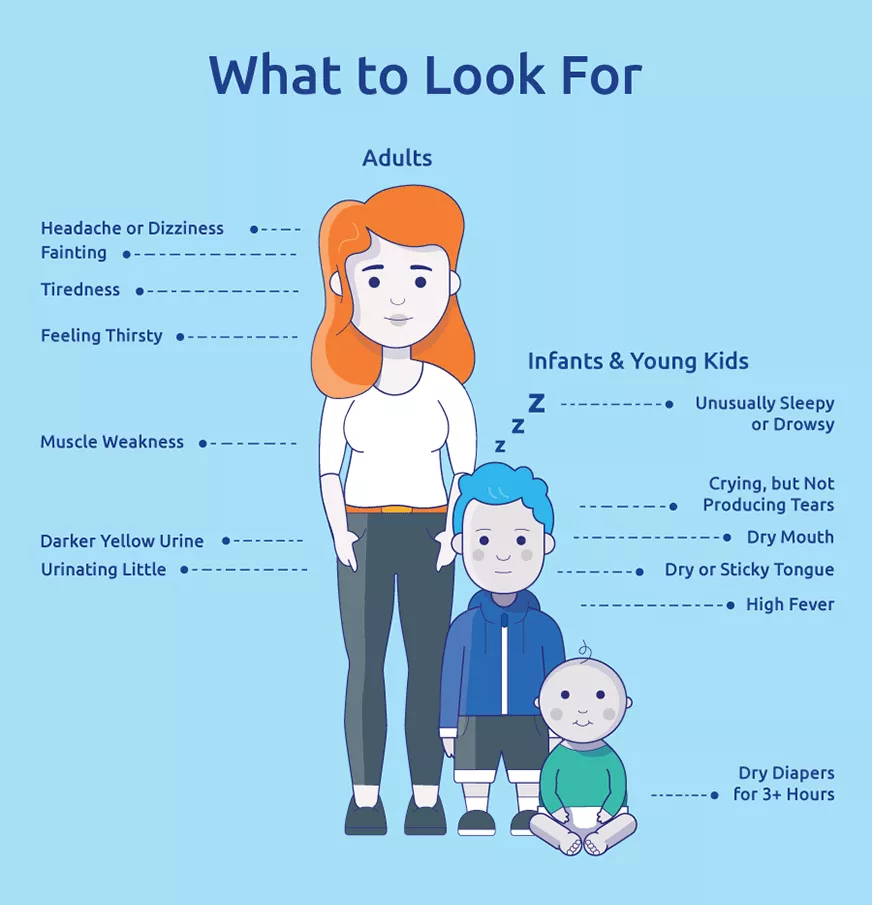Dodging dehydration: signs and symptoms of dehydration
Are you dehydrated?
Know the signs and symptoms of dehydration before it becomes a problem.
VIEW INFOGRAPHIC
What is dehydration?
According to the Mayo Clinic, dehydration is a medical condition that occurs when you use or lose more fluid than you take in, and your body doesn't have enough water and other fluids to carry out its normal functions. The severity of dehydration ranges from mild or moderate to more serious—but, luckily, mindful hydration habits can help you avoid most cases of dehydration before they start.
Mild to moderate dehydration is often a result of not drinking enough fluid—especially during hot weather or during vigorous exercise. More severe dehydration is a medical emergency and is less common, but can result from excessive vomiting or diarrhea.
Infants, young children, and the elderly are especially susceptible to dehydration, but anyone, regardless of age, can find themselves wondering if they’re drinking enough fluid. So, it’s important to know the signs and symptoms of dehydration.
What are the symptoms of dehydration?
Knowing about dehydration symptoms and having healthy hydration habits can help you avoid a problem. Common symptoms of dehydration are feeling thirsty, producing darker urine, feeling tired or weak, headaches, and muscle cramps. Reference our chart for more signs of dehydration, and information about what to do if you or someone in your care is experiencing dehydration symptoms.
To help promote more mindful hydration habits, track your water intake, know how much water to drink, and be more vigilant about drinking water in hot weather or during vigorous exercise.
Dehydration symptoms in infants and young kids
Infants and young children are more susceptible to dehydration than adults. One reason is physiological. In general, kids lose more water through their skin, because they have a greater surface-to-volume ratio (in other words, their body is made up of more water, so they can lose it faster than grown ups). Kids’ urine is often more diluted, too, which means they pass water through their bodies more quickly than adults. But the most likely cause of dehydration in young children is severe diarrhea and vomiting. If a little one is sick, consult with a medical provider who can advise on a plan to replace lost fluids. Learn more about why water is so important for kids.
Symptoms of dehydration in infants and young kids may look different than the symptoms in adults. Keep an eye out for dry diapers or less frequent trips to the bathroom, crying without making tears, unusual fatigue, dry mouth with a sticky tongue, or a high fever. These can be symptoms of severe dehydration. Always call your doctor immediately if something doesn’t seem right.
Keeping kids hydrated can be a challenge for parents and caregivers. Many young kids have trouble recognizing and communicating the sensation of thirst. They rely on you–the parents or caregivers–for meeting their hydration needs by prompting fluid consumption throughout the day.
What can you do to treat dehydration?
Call a medical professional if you or anyone in your care is experiencing signs of dehydration. Only your doctor should advise on a plan to assess and treat dehydration.
